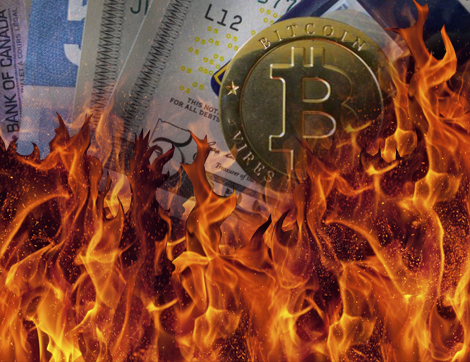
• “Bitcoin” facing uncertain future after series of suspicious setbacks
By Keith Johnson
It’s been a tough week for bitcoin, the popular alternative currency that allows consumers to transact business discreetly, outside the purview of the controlling central banks.
On February 7, Japan-based Mt. Gox, the world’s third-largest venue for exchanging bitcoin into United States dollars, caused the price of the digital currency to lose more than 20% of its beginning week value of $850 after it suspended trading amid an “increase in withdrawal traffic.” By Monday, the company announced it would halt withdrawals indefinitely after detecting “unusual activity.” As a result, the price of bitcoin plummeted a staggering 27% from its Friday closing price of $692 to $500.
This is just the latest setback for the original bitcoin exchange, which once boasted handling 80% of all bitcoin transactions but now barely represents 14% of the market currently in trade. In May 2013, Mt. Gox suffered a major public relations disaster after its U.S. bank account was seized by the Department of Homeland Security for failing to properly register as a money-services company. Prior to that, the company was targeted with a series of computer hacking attacks that caused delays in processing requests and gained them a reputation for slow payouts—something they’ve found hard to shake.
“The Mt. Gox affair is a symptom, not a cause, of deep-seated problems in the bitcoin system,” wrote Michael Hiltzik in a recent article for the Los Angeles Times. “It’s a sign that bitcoins aren’t ready to serve as anything but pieces in a very risky, speculative game.”
Others aren’t nearly as skeptical as Hiltzik. Among them is millionaire investor and bitcoin guru Roger Ver, who is taking Mt. Gox’s recent troubles in stride.
“This is just another temporary bump on the wild ride of bitcoin,” Ver recently told this AMERICAN FREE PRESS reporter. “I think bitcoins will increase to more than $10,000 each in the future.”
In November 2013, Ver saw the writing on the wall for Mt. Gox and told Wired magazine that he would not recommend using it as an exchange, adding: “Anybody who has enough information about what’s going on in the bitcoin world, you would not buy your bitcoins on Mt. Gox.”
When asked by this AFP reporter what the Mt. Gox debacle means for the bitcoin economy as a whole, Ver replied, “In the long run it is good for bitcoin since people will be more likely to use more responsible exchanges in the future.”
In an effort to gauge how others within the bitcoin community are reacting to the recent setback, this newspaper reached out to Jinyoung Lee Englund, director of public affairs for the Bitcoin Foundation.
When asked to respond to detractors who say that bitcoin is doomed to failure, Mrs. Englund replied: “It’s fair to say that at this stage of growth, the possibility of bitcoin succeeding versus failing is about 50-50. Obviously, there are those that believe that the odds are more in [our] favor, such as the three top tech venture capital firms in the nation as identified by Forbes magazine [that] invested over $30 million into this space in the last quarter alone. . . . But by no means do we advocate that anyone invest his life savings into bitcoin. That is a very risky endeavor. If you intend on participating in this experimental stage, be willing to lose everything you put in.”
This AFP reporter also contacted Jonathan Levin, a post-graduate economics student at the University of Oxford who has been tracking bitcoins currently in circulation. Levin sees a bigger problem than Mt. Gox on the bitcoin horizon. While preparing virtual currency statistics for the website Coinometrics.com, Levin found that huge stocks of bitcoins sitting in dormant accounts could dramatically impact the currency’s future price and stability.
“Of the total money supply, one-third of [bitcoins] are sitting in addresses that have not been touched in a year,” Levin told AFP. “If those coins were to move, then the market would have to adjust, decreasing the price of bitcoin. This dormancy of coins essentially reduces bitcoin to commodity money that can be bought at a spot price during a transaction and used as a medium of exchange. This would essentially [re-]define bitcoin as a payment network rather than a unit of account.”
Levin suggested that this “concentration of wealth” among some bitcoin users could be potentially detrimental to its acceptance as a viable medium of exchange. “In previous virtual currency schemes there have been organized methods for getting spent coins back to the users to keep the economy going,” he said. “The mechanisms by which this happens in bitcoin are far from certain and could mean that we get an oligarchic society, which I am sure none of us want. This means that when people decide whether to buy or not buy bitcoins they are speculating on the motives, incentives and decisions of the people that control large amounts of bitcoin.”
When asked by this AFP reporter to respond to Levin’s arguments, Roger Ver replied: “I don’t share these concerns. Early adopters with large caches of bitcoin have the proper incentives not to do anything to destroy the value of their bitcoin savings.”
Of course, the same could be said for other commodities, especially precious metals like gold, which often stay dormant for years as investment vehicles. Then again, precious metals have intrinsic value, whereas bitcoin—like all other fiat currencies—is only as strong as the faith one has in them.

Keith Johnson in an investigative journalist and creator of the Revolt of the Plebs.

